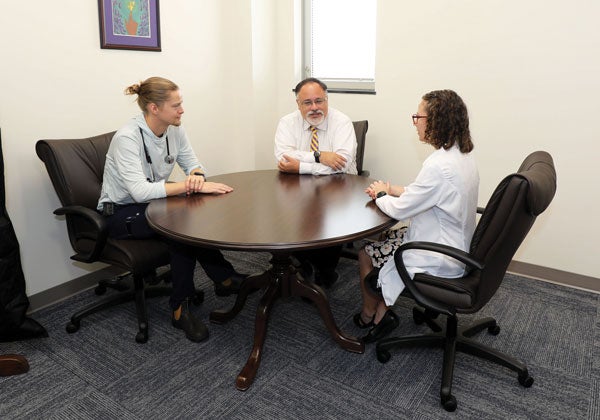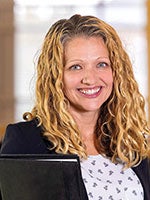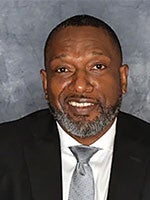Telehealth, training and outreach
Diverse efforts aim to prioritize mental well-being
In the wake of surging demand for mental health support, the U.S. is grappling with a critical shortage of mental health providers, creating a stark imbalance between the need for assistance and the available resources.
Whether it’s through educating new mental health professionals or alumni working in the community, East Carolina University is working to create solutions.
“Access remains an issue because we quite simply do not have enough providers,” says Dr. Michael Lang ’02, chair of the ECU Department of Psychiatry and Behavioral Medicine and chief of psychiatry at ECU Health. Many providers report wait times between five and eight weeks, with some specialties having months long waitlists, he says.
For perspective, here are some numbers from the National Alliance on Mental Illness:

As chair of the ECU Department of Psychiatry and Behavioral Medicine, Dr. Michael Lang mentors future medical professionals such as Samantha Studvick and Mark McAlister.
- One in five U.S. adults experiences mental illness each year.
- One in 20 experiences serious mental illness each year.
- One in six U.S. youth aged 6-17 experience a mental health disorder each year.
- 50% of all lifetime mental illness begins by age 14 and 75% by age 24.
- Suicide is the second-leading cause of death among people aged 10-14.
And while there has been an influx of patients seeking treatment for mental health concerns, there has not been a corresponding increase in providers. The federal Health Resources and Services Administration in 2022 designated 2,774 of the 3,144 counties in the U.S. as mental health provider shortage areas.
Training future providers
ECU offers a range of degrees aimed at training the next generation of mental health practitioners, from counseling and social work to nursing and medicine. Alumni in these disciplines are working to serve rural populations, expand national knowledge and teach the next generation of providers.
For example, all ECU medical students spend a rotation in the psychiatry department. Lang, as department chair, manages the largest conglomeration of behavioral health providers in the East.
“I do a lot of education of fellow physicians and medical students so they are not afraid of psychiatric medicines or are not afraid to sit down and talk to their patient about what can be going on,” he says.
Lang is overseeing the building of a behavioral health hospital in Greenville’s medical district in conjunction with Acadia Health. It’s scheduled to open in 2025 and will feature the region’s first inpatient beds dedicated to children and adolescents. He’s also working to create five psychiatric medicine fellowships at ECU.

Marissa Carraway ’07
Marissa Carraway ’07 ’11 ’14, a licensed psychologist and clinical assistant professor with the ECU departments of family medicine and psychology, teaches family medicine residents to recognize and work with behavioral health issues among their patients.
“We know that most patients who come to a primary care appointment for any reason will not follow through with a behavioral health referral,” Carraway says. “We know that the majority of people utilize primary care providers for mental health care, so we need to meet them where they are.”
Ways to bridge the gap
In an American Psychological Association survey, 96% of psychologists said they would continue to incorporate telehealth into their practices after the pandemic.

Michelle Tennant ’20
“As a therapist with a significant percentage of clients in abusive relationships, virtual sessions allowed far more privacy and accessibility than we ever would have had otherwise,” says Michelle Tennant ’20, who owns Morning Light Counseling in Greenville. “It’s a lot easier to keep a session private when it’s just a call while you’re at work versus driving to and from a therapist’s office when your partner is tracking your every move.”
Dr. Requita Lee ’11 ’17 of Charlotte, a psychiatrist at the Center for Emotional Health, sees all her patients remotely and notes that patient safety and not needing transportation are positives.
ECU family medicine is working on the Healthier Lives at School and Beyond, a telemedicine project that connects behavioral health and medical providers with students in rural schools. Erica Taylor ’14 leads the project. Read more about the program

Victor Armstrong ’98
Telehealth isn’t the only advantage technology provides for mental health awareness and treatment. Victor Armstrong ’98, a social work alumnus in Charlotte, says technology can be a way to reach communities in rural areas and create hubs for resources for individuals seeking help. He’s the vice president for health equity and engagement at the American Foundation for Suicide and Prevention.
“It affords us an opportunity to get upstream in ways that we have not been able to before,” he says. “One of the things I often share with people is that suicide itself is not a disease. It’s the worst possible outcome of a combination of a lot of very complex things that can include mental health challenges. But if it’s a combination of complex things, it means there are often opportunities to intervene before someone reaches that point of suicidality if we have the right resources at the right time and can reach people.

Grace Marks
“When you start thinking about how we can use technology in a more creative way and think about those communities that have historically had difficulty accessing resources, technology provides us a whole different way of looking at them,” he says.
Along with technology, churches can also be a resource. “The church may be a hub where you can go there and connect and reach out to a coalition, or it can be a place where you may open the doors for a therapist to come on site at that church and people can access services that way,” Armstrong says.
Peers can also be a resource, especially on campus. For example, Grace Marks, a senior nutrition and dietetics major from Charlotte, felt stressors such as cramming for tests, juggling priorities and plain old loneliness. She sought out resources on campus and now is passing along what she knows as a well-being ambassador with Campus Recreation and Wellness. She talks with students about topics such as mental health, nutrition, drugs and alcohol, safe sex and others.
“The experience has been great,” she says. “It makes me feel good knowing that I am able to impact the students of ECU and direct them to different resources.”
Doug Boyd contributed to this article.
